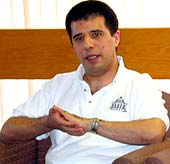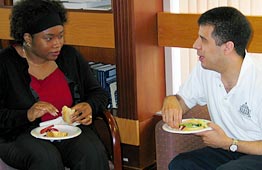Court Skirts Remedy Issue inGrutterDecision

Law Professor Kim Forde-Mazrui thought he knew how the Supreme Court would probably decide the already infamous Grutter v. Bollinger case, in which University of Michigan applicants challenged the undergraduate and law school admissions policies. "Now I have to regroup because I was frankly stunned" when the Court upheld the law school's policy, and with it affirmative action in higher ed. "So it's all new and I don't know where this is going," he acknowledged to students and professors who met to talk about the decision at a July 24 lunch sponsored by the Center for the Study of Race and Law. Forde-Mazrui, director of the new Center, questioned whether the Supreme Court made the right decision and based it on the wrong reasons.
"There's something unsatisfying to me [for the Court] to justify on something less compelling and something that is not the real reason," he said, adding that affirmative action was plainly instituted to remedy an injustice rather than simply to add diversity to education. "There are costs to relying on the wrong reasons."
Forde-Mazrui charged that diversity itself doesn't rectify injustices, and may in fact "result in helping the wrong people." If you want to undo the effects of legally sanctioned discrimination, he said, the most affected and most disadvantaged should benefit from a policy of remedy — an aim diversity itself won't accomplish. Some minorities who may benefit from a policy of affirmative action, such as recent immigrants, may not have experienced significant discrimination, especially the effects of past discrimination.
"Over time, if we reduce the racial gap [in colleges], there may be a deception going on," he added. If more middle-class blacks are in college, it may appear that we are racially equal, but more poor, urban blacks who have been most affected by past discrimination may not benefit. "I fear that diversity may fail in results to reach those people."
For Forde-Mazrui, Grutter hit close to home. He graduated from Michigan's undergraduate and law school programs, later clerking on the Sixth Circuit Court of Appeals, which had upheld Michigan's policy before the case reached the Supreme Court.
His own experiences with race caused him to focus on it as an area of scholarly interest. Raised in a middle-class, mostly white Ann Arbor neighborhood, Forde-Mazrui has a mixed racial heritage (half-Kenyan and half-British), and didn't gain his American citizenship until after law school. He realized he had stereotyped black students when he was working as a dishwasher in high school and took out the trash one day. Forde-Mazrui, who has a sight impairment, saw a group of what he thought was black teens hanging out by the dumpster, and was disappointed by his own relief when he realized they were white. When he got to college, a hard-working black engineering student across the hall made a strong impact on him. "It was such a stark difference than the image I was used to growing up in public schools," he said.
Forde-Mazrui acknowledged having mixed feelings about affirmative action. He recalled a female friend who claimed he got into Michigan (and not her) because of his race, even though he had a higher GPA. When told the news of his acceptance, his wife's co-worker said "of course he [was accepted] — he's both black and blind." Michigan Law Review has an affirmative action policy, and on his application he decided not to mark his ethnic background, but was accepted. He later found himself allied with more conservative Review members in fighting the journal's affirmative action policy because of its stigmatizing effect on minority members who interviewed with employers aware of the policy. More recently, he was anxious for his son, who is white and adopted, to attend Michigan so he can experience a more even racial playing field, but because of his son's race, it may have been harder for him to get admitted. "I felt torn about it," Forde-Mazrui acknowledged. "I support affirmative action, but with some hesitation."
"Those who support affirmative action were relieved by this opinion," he said, counting himself among that number. The Court has grown more conservative since the 1978 Bakke case, so the decision surprised many. Justice Sandra Day O'Connor, the swing vote in Grutter, had nixed equating racially diverse ownership with diverse broadcasting in Metro Broadcasting (1990), seemingly spelling doom for future affirmative action cases.
Forde-Mazrui said the Court's decision doesn't clarify whether achieving racial diversity is a compelling governmental interest, or even what diversity means. Is racial diversity an end, or part of the goal? Either way, Forde-Mazrui said, racial diversity has educational benefits, such as breaking down stereotypes and creating understanding among college students; societal benefits, such as ensuring that businesses and the military will have a diverse applicant pool; and political legitimacy — appearing to have an open society in regards to race. The Court stressed that the path to political leadership needs to be available to all races. The majority decision used phrases like "visibly open" and "confidence of the people" — whether or not affirmative action actually has an effect on education, it's critical to appear open. Simply being inclusive is critical to legitimacy, the decision suggested.


He questioned whether the implications of Grutter should be limited to higher ed. Should employers use affirmative action? Or juries? If you suggest that racial diversity adds needed perspective, what does that mean for voting and political leadership? He noted that studies on juries have shown that when people of different races are in a room, they may speak more on the facts rather than rely on stereotypes. Likewise, race may or may not impact the classroom, depending on the subject of the class and whether it is discussion-oriented.
"There's definitely something missing from the class if it's all females," added Law Professor Anne Coughlin, who has taught courses on gender and the law and criminal law. Without racial diversity, "there's definitely a perspective missing in the room when you're talking about police" and other issues that touch on race.
The Court's split decision on the undergraduate and law school cases may make life more difficult for colleges that attempt to quantify ethnic backgrounds or other factors in order to balance out individual application readers' opinions. But Forde-Mazrui suggested that the two admissions policies basically accomplished the same thing, and the only difference was a question of degree. The Court drew a line between the two that in some ways seems "purely arbitrary," he said. Michigan's undergraduate policy failed on the tailoring prong — awarding 20 points to some minorities proved "too automatic" for the Court, Forde-Mazrui said, "and secondly, that it's too much."
One student asked whether socioeconomics would be a valid proxy for race. "There's something about race that affects somebody's experiences in a way that can't be captured" by looking at socioeconomics alone, Forde-Mazrui responded. Furthermore, basing affirmative action on socioeconomics provides an ineffective remedy for racial discrimination, and race-neutral policies won't help the disproportionate number of poor minorities.
Even as affirmative action supporters celebrate the decision, opponents are mounting a referendum campaign in Michigan. Forde-Mazrui said challengers allege that primary and secondary education should be improved rather than institute affirmative action — but "what's stopping them from doing it now?" In California and Florida, states that have already eliminated race-based college admissions policies, there has not been substantial new investment in lower ed, he said.
"At the very least we should remind ourselves of what is causing blacks and other minorities to fail to meet educational standards," he said. Many live in areas where nine out of 10 children are born out of wedlock, and in high-crime zones. Education at elite schools hardly touches their lives.
Bakke — and now Grutter — have "recognized and maybe even reinforced the way we think of the legitimacy of society and the role of race in it," he said. "We're still struggling to do it in a way that doesn't seem excessive."
Founded in 1819, the University of Virginia School of Law is the second-oldest continuously operating law school in the nation. Consistently ranked among the top law schools, Virginia is a world-renowned training ground for distinguished lawyers and public servants, instilling in them a commitment to leadership, integrity and community service.


